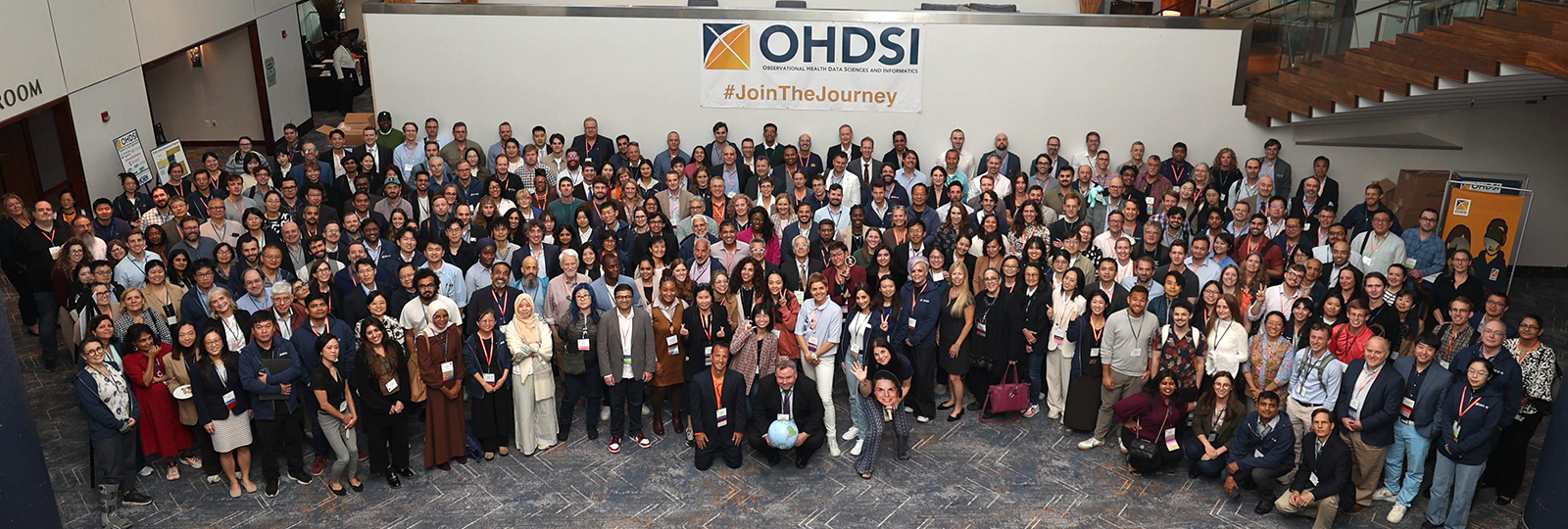
OHDSI Sets Path For Enhancing Trust In Science,
Engaging Global Community at 2025 Symposium
The 2025 OHDSI Global Symposium brought together more than 400 researchers, clinicians, and data scientists from around the world for three days of collaboration, learning, and community building. Coordinated by the Columbia Department of Biomedical Informatics (DBMI), the event centered on two vital themes: improving trust in science and strengthening global collaboration in network studies. Through keynotes, panels, tutorials, and community showcases, attendees explored how open science, transparency, and collective expertise can drive more reliable and reproducible real-world evidence to inform better health decisions.
Now in its second decade, the Observational Health Data Sciences and Informatics (OHDSI) community continues to grow in both reach and impact. Today, more than 4,700 collaborators across 88 countries share a unified mission: to improve health by empowering a community to collaboratively generate the evidence that promotes better health decisions and better care. OHDSI’s global data network now includes 544 standardized data sources from 54 countries—representing more than 974 million unique patient records mapped to the OMOP Common Data Model—enabling large-scale, reproducible studies that transcend geographic and institutional boundaries. A main priority within the community is building the OHDSI Evidence Network to facilitate collaborative research efforts and ensure the quality and integrity of data, and Columbia is proud to be an initial member of this group.
Columbia DBMI has served as OHDSI’s coordinating center for more than a decade, supporting the community’s growth, technological infrastructure, and scientific leadership. Each year, DBMI faculty, students, and trainees play integral roles in shaping the symposium—delivering talks, sharing research through posters, moderating discussions, and leading hands-on tutorials. Their continued contributions exemplify Columbia’s commitment to advancing open, collaborative biomedical research and to training the next generation of leaders in data science and health informatics.
If you are interested in learning more about how OHDSI conducts research, DBMI will host the second Summer School in Observational Health Data Science & Informatics, AI, and Real World Evidence June 22-26, 2026. The Columbia OHDSI Summer School provides health professionals, researchers, and industry practitioners with an immersive, hands-on training to working with real-world health data and generating real-world evidence (RWE). Participants will explore the types of healthcare data captured during routine clinical care—such as electronic health records and administrative claims—and learn how to standardize these data using the OMOP Common Data Model to support collaborative, distributed research as part of a data network.
DBMI Highlights from the 2025 OHDSI Symposium
George Hripcsak, MD, MS, Vivian Beaumont Allen Professor of Biomedical Informatics, provided the State of the Community talk to open the main conference. He also led the advanced tutorial “Population-Level Effect Estimation Applications to Generate Reliable Real-World Evidence.”
Patrick Ryan, PhD, Adjunct Assistant Professor of Biomedical Informatics, provided the Closing talk to conclude the main conference, and he led the initial plenary talk on “Why network studies are necessary to improve trust in evidence”. Patrick also led the advanced tutorial “Clinical Characterization Applications to Generate Reliable Real-World Evidence.”
Harry Reyes Nieva, PhD, moderated the first set of lightning talks as part of the Collaborator Showcase. Reyes Nieva, who was recently named a 2025 STAT Wunderkind, also led the Early-Stage Researchers Workgroup session on the final day.
Hsin Yi “Cindy” Chen, a MD-PhD trainee, provided a lightning talk on her poster Heterogeneity of Treatment Effects Across Nine Glucose-Lowering Drug Classes in Type 2 Diabetes: Extension of the LEGEND-T2DM Network Study. Chen was voted the Best Community Contribution in Clinical Applications Award winner by symposium attendees. She also assisted in the Clinical Characterization tutorial.
Anna Ostropolets, MD, PhD, Adjunct Assistant Professor of Biomedical Informatics, led the advanced tutorial “Using the OHDSI Standardized Vocabularies for Research.” She also led the Vocabulary workgroup meeting.
Karthik Natarajan, PhD, Assistant Professor of Biomedical Informatics, assisted in the advanced tutorial “Developing and Evaluating Your Extract, Transform, Load (ETL) Process to the OMOP Common Data Model.”
Tara Anand, a PhD trainee, assisted in the Population-Level Effect Estimation tutorial.
Adit Anand, a PhD trainee, was the lead author and presenter for the poster Preliminary Evaluation of Common Data Elements Coverage of Oncology Clinical Trials’ Eligibility Criteria within OMOP.
Numerous DBMI faculty and trainees were research co-authors for the Collaborator Showcase, which included over 130 posters or demos from the global community.
Thank you to the numerous DBMI members who served as volunteers for the event, which took place Oct. 7-9 at the Hyatt Regency in New Brunswick, N.J. Learn more about OHDSI by visiting its homepage or check out its 2025 “Our Journey” annual report.
